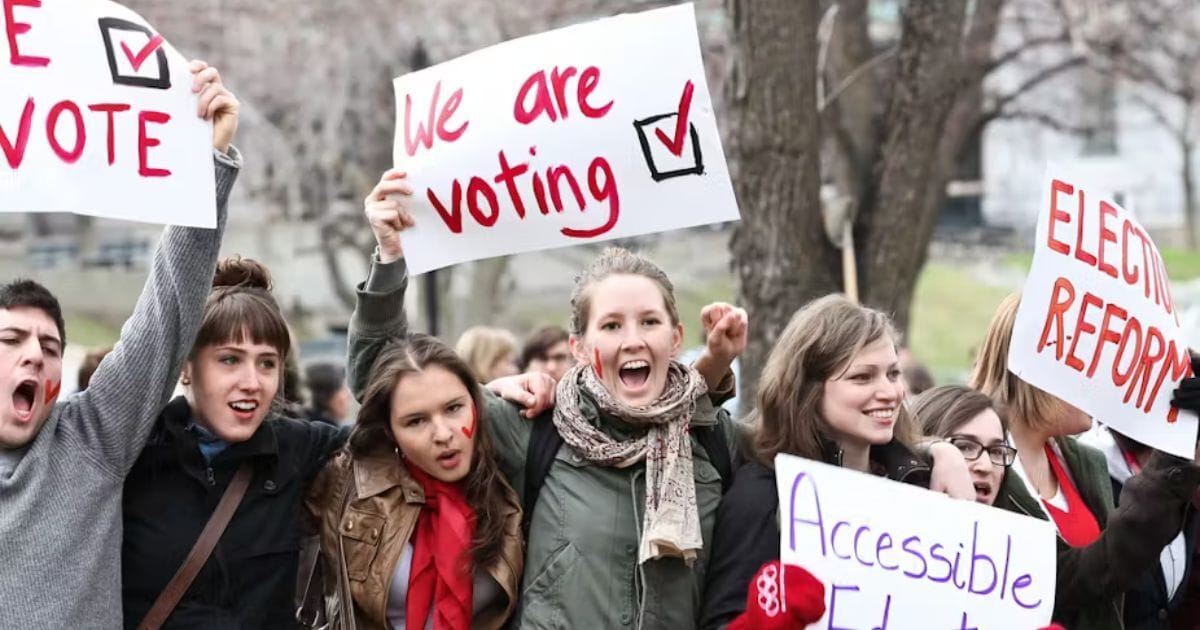- Thinking About It by Zee Feed
- Posts
- OK Zoomer
OK Zoomer
Plus, the Trump x Epstein recap.

While everyone online was bitching about the Gen Z stare this week, the UK government was doing something very interesting: introducing a bill to lower the voting age. The changes as part of the ‘Elections Bill’ will allow 16- and 17-year-olds to vote in general elections – the next general election is due in 2029. According to reporting in the BBC, around 3% of the UK population is in this age bracket. 16- and 17-year-olds have been able to vote in Scottish elections since 2015, and Welsh teens have been able to vote in the UK general elections since 2021.
Minister for Democracy Rushanara Ali said allowing older teens to vote was an effort to “modernise” democracy in the UK and take “a generational step forward in restoring public trust and boosting engagement in UK democracy.”
It’s a radical move and one that I was surprised to learn is supported by all UK political parties except the Conservative Party (any guesses why?) But it’s not exactly popular with the public.
When the UK makes a big change like this, the immediate question is: would we do this in Australia?
The Make It 16 campaign has been pushing for this change in Australia, and they make some compelling arguments. But the argument that has stuck with me most since we interviewed some of the young people involved in the campaign back in 2023 was this one:
“We talk about things like young people frequently being excluded from the demands that affect their lives, such as employment, education, housing, tax, and also the environment. Due to their lack of enfranchisement, people aged 16 to 17 cannot hold governments to account which results in Youth Affairs seldom being a priority.”
In Australia, youth issues do seem to get ignored in parliament and policy-making. And even when there is clear support and demand from voters for policies that would benefit young people, those in power seem to ignore the call. The federal government creates youth advisory groups, only to completely ignore them – it’s for the sake of optics only.
And many of the arguments that could be made against letting teens vote – that they might be uninformed, uneducated or not take it seriously – apply equally to all voting-age adults in my opinion. Voting teens and voting adults alike deserve to get proper education on how politics works and how to participate in democracy.
Monique Ryan, the independent MP for Kooyong (Vic), said she will introduce a bill to lower the voting age in the new term of parliament but realistically, I don’t see it getting anywhere. While the UK is giving voting rights to 16-year-olds, the Australian government thinks at that age you are only just mature enough to get access to social media accounts.
I wonder if Labor would have rushed through the teen social media ban if the voting age was 16? There is definitely not enough votes in it to have cost them the election, but does the appetite for that legislation change if the targeted group can actually hold you accountable in some way? It’s a thought experiment that I’ll be applying to the new policy proposals we see in the next three years of government.
Still, this uncharacteristically ambitious move from the UK government will provide an interesting comparison point to Australian politics and elections once their lower voting age comes into effect.
Smart stuff on the Internet 💭
All the stuff I found on the web that made me think, smile, or have an ‘aha!’ moment. Spend your Sunday reading them – you'll be better off for it:
The Politics Of Innocence And Underwear on The Coveteur
“In an attempt to de-center from the male gaze, the antithesis of the “cool girl” beckons with the promise of innocence and youthfulness, but has just as much capacity to backfire. The temptation of innocence is a well-recorded concept throughout history: The value of a virgin in the 19th and early 20th centuries, schoolgirl tropes in pop culture and pornography, Nabokov’s blockbuster novel “Lolita,” wherein self-proclaimed pedophile Humbert Humbert romanticizes, falls in love with, and kidnaps a twelve-year-old girl. As much as there is a call to reclaim the aesthetics of girlhood, how much of it still caters to these fantasies?”
“He’s a Lot of Fun to Be With”: Inside Jeffrey Epstein and Donald Trump’s Epic Bromance on Vanity Fair
A piece from 2021 that’s worth revisiting as context for the latest developments, like the insane letter Trump wrote to Epstein on his 50th birthday. “Epstein and Maxwell invited him everywhere—and Trump reciprocated. At one highly selective party in 1992 at Trump’s Mar-a-Lago resort in Palm Beach, The New York Times reported, no fewer than 28 attractive young women were flown in to participate in a calendar-girl competition as entertainment. The organizer, George Houraney, who ran American Dream Enterprise, a small Florida company that staged a calendar-girl contest and other events, was appalled to learn that there were only two male guests—Trump and Epstein.”
Why the Australian Climate Case verdict is an ‘encouraging loss’ on Crikey
By me! “When climate litigation challenges governments directly, there is a reputational and political cost, regardless of the verdict. This is particularly relevant in Uncle Paul and Uncle Pabai’s case, with the Albanese government forced to publicly wear the criticisms Justice Wigney directed at the 2015, 2020 and 2021 emissions-reduction targets set by the Turnbull and Morrison Liberal governments. Is it a good look for any government to be arguing in the courts that it does not have a duty of care to its own citizens, successfully or not?”
For more on the Australian Climate Case, also worth listening to this episode of the 7am podcast (which is no longer owned by Schwartz media).